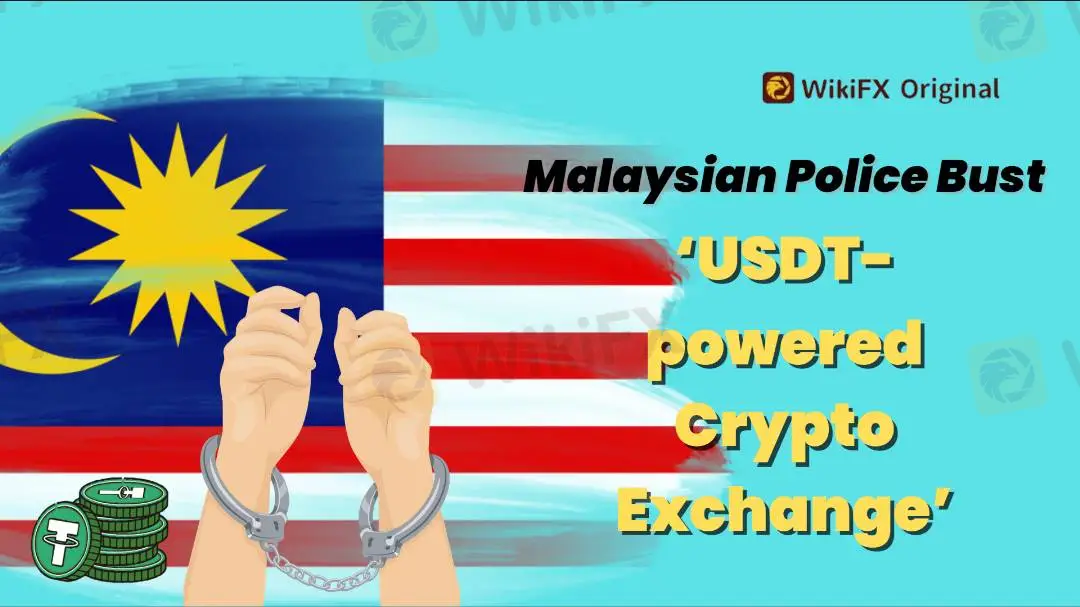简体中文
繁體中文
English
Pусский
日本語
ภาษาไทย
Tiếng Việt
Bahasa Indonesia
Español
हिन्दी
Filippiiniläinen
Français
Deutsch
Português
Türkçe
한국어
العربية
Malaysian Police Bust ‘USDT-powered Crypto Exchange’ – Suspects ‘Sold Crypto to China’
Abstract:Malaysian authorities have shut down an illegal cryptocurrency exchange facilitating USDT-to-cash conversions for Mainland Chinese customers. Forty individuals were arrested, and assets such as cash, gold, and luxury items were seized. The exchange is suspected of involvement in illegal online gambling. Stricter regulations are being implemented in Malaysia to prevent such activities.

Malaysian authorities have taken action against a suspected illegal international cryptocurrency exchange operating with USDT (Tether) as its primary currency. A total of forty individuals have been apprehended in connection with the case. According to reports, the exchange was allegedly facilitating the conversion of USDT into cash for Mainland Chinese citizens. The operation to shut down the exchange was a joint effort between the police's commercial crime investigation team and the National Financial Crime Center. Authorities claim to have successfully dismantled the exchange and suspect it of also offering illicit online gambling services. Detectives had been conducting an investigation into the activities of this exchange for a considerable period of time.
According to authorities, the exchange operated a systematic process of converting funds received from China into USDT, and subsequently transferring the tokens back to individuals in China. Detectives discovered evidence indicating that the group conducted cryptocurrency exchange activities within Malaysia without proper authorization. It is mandatory under Malaysian law for all cryptocurrency-related companies to register their operations with regulatory bodies. Failure to obtain the required permits can result in punitive measures. In a recent development, the Securities Commission of Malaysia instructed Huobi Global to cease its operations in the country. The commission specifically directed Huobi Global to disable its website and mobile applications on platforms such as the Apple Store and Google Play. Despite China's ban on cryptocurrency trading, the demand for crypto among Chinese citizens is believed to remain robust.
Malaysia: Where Did Suspected Crypto Exchange Operators Come From?
A coordinated operation by Malaysian police resulted in the simultaneous raid of multiple locations, leading to the apprehension of both male and female suspects. In an official statement, the police specified that the arrested individuals were aged between 20 and 58. The suspects were identified as Malaysian nationals, comprising 15 men and six women from China. Additionally, one Singaporean man was also taken into custody.
During the operation, law enforcement officers successfully seized a total of 88 mobile phones, as well as a substantial amount of cash, including $5,000 in USD. Additionally, they confiscated various valuable assets such as gold bars, luxury watches, cars, handbags, and a range of assorted gold jewelry.
Further investigations revealed that the exchange in question was allegedly involved in running a gambling syndicate, primarily catering to Taiwanese clientele. It is suspected that the suspects facilitated the use of “money mule” bank accounts by Chinese individuals, allowing them to exchange chips for online gambling platforms.


Disclaimer:
The views in this article only represent the author's personal views, and do not constitute investment advice on this platform. This platform does not guarantee the accuracy, completeness and timeliness of the information in the article, and will not be liable for any loss caused by the use of or reliance on the information in the article.
Read more

Can Your Financial Literacy Protect You from Scam Brokers?
You can protect yourself from any kind of investment scam trough your financial Literary . Financial literacy is your strongest defense against investment scams. While the digital age brings countless benefits, it also opens the door to new risks. One growing concern is the steady rise in scam brokers within the forex market.

Scam Alert: 5 Key Reasons to Avoid BazaarFX at All Costs
Before You Act, It's Always a Good Idea to Review Any Broker Thoroughly Know about it first—and only then invest your hard-earned money with the broker. Below are five crucial reasons why you should not choose BazaarFX. Otherwise, you may end up becoming a victim.

EXPOSED: 10 Scam FX Brokers : You Must Avoid in 2025!
Beware, Investors and traders! If you’re planning to invest your money in the forex market, make sure you don’t end up investing with these scam brokers. This is the warning list issued by International Organization of Securities Commissions (IOSCO)

Reasons Why You Can't Trust UbitMarkets for Forex Investments
UbitMarkets is one more forex broker that scams investors under the guise of high returns. Check out our exposure story.
WikiFX Broker
Latest News
The Dollar Keeps Falling: How Should We View Exchange Rate Volatility?
Asia-Pacific markets rise as investors parse a slew of data releases
Asia-Pacific markets mostly rise as investors parse a slew of data releases
WikiFX Gala Night Malaysia Concludes Successfully
IG Group Unlocks Over £425 Million amid a Capital Reduction
Gold Prices Fall by INR 39,300 in the Last Week? What's Next Week's Outlook?
European stocks open slightly higher as UK-U.S. trade deal cuts autos, aviation tariffs
Treasury yields tick lower as Trump's spending bill in focus
European stocks mixed as UK-U.S. trade deal cuts autos, aviation tariffs
Ripple and SEC Drop Appeals, Bringing 5-Year Legal Saga to a Close
Currency Calculator


